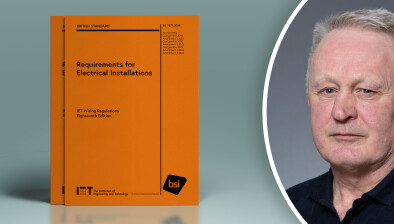UK immigration plans could be ‘ticking time bomb’ for Scottish construction

Alan Wilson
The UK Government’s proposed changes to immigration rules could have devastating consequences for the Scottish construction sector, according to SELECT.
Describing the plans as a “ticking time bomb,” the electrotechnical industry trade body warned that tightening the criteria for skilled foreign workers may trigger a widespread departure of overseas professionals from the UK. This could prompt a migration of Scottish tradespeople to England to fill the resulting gaps, leaving Scotland critically short of skilled labour.
The trade body also echoed concerns raised in a new report this week, emphasising that the looming skills shortage would significantly hinder Scotland’s transition to a net zero economy, particularly with fewer qualified workers available to install and maintain renewable energy systems.
Alan Wilson, managing director of SELECT, raised the alarm directly with First Minister John Swinney during a recent meeting of Scottish business leaders, where he shared industry-wide concerns.
“Raising the bar for skilled worker visas might seem admirable, but in practice, it risks drawing skilled labour away from Scotland to areas like London, where foreign workers currently make up around half the workforce,” said Wilson.
“If those workers leave, Scottish professionals are likely to be lured south by better pay, leaving a gaping hole in our own workforce. Without the ability to recruit internationally, we could find ourselves without the skills needed to build the infrastructure of a net zero future.”
The UK Government’s white paper Restoring Control Over the Immigration System, released on 12 May, proposes raising the skilled worker qualification threshold from RQF Level 3 (equivalent to Scottish Highers) to Level 6 (degree level).
Wilson argues that this change would disqualify many experienced tradespeople and worsen existing recruitment issues. He also warns it may discourage firms from hiring apprentices, risking long-term harm to the industry.
“The sector is already grappling with serious recruitment challenges,” he said. “We need around 26,100 additional workers in Scotland between 2024 and 2028, according to the Construction Industry Training Board, but we’re only seeing about 6,500 new apprenticeship starts per year.”
His comments follow a new survey from Aberdeen & Grampian Chamber of Commerce showing a significant outflow of skills and investment from the UK’s energy sector. The 41st Energy Transition Survey found that two-thirds of firms expect to grow their overseas workforce over the next five years, while nearly half reported that current staff are already relocating abroad.
Wilson, who also chairs the Construction Industry Collective Voice, warned that the immigration proposals could also threaten Scotland’s architecture schools, many of which rely heavily on international student fees.
“If students stop coming here due to uncertainty over post-study work opportunities, it could undermine the financial viability of entire programmes,” he said. “We risk losing both our ability to train future architects and the international talent that enriches our sector.”
He concluded: “This is a high-stakes moment for Scottish construction. Unless these immigration plans are reconsidered, we may be left without the skilled workforce needed to build the sustainable, modern country we aspire to.”
















